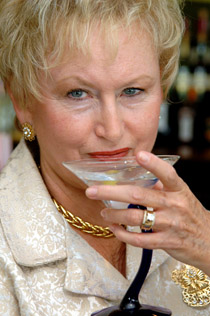Older Persons Become Alcoholics
Older People Are Quiet Alcoholics
Gretchen Heuring | ElderThink | 02.04.11
A couple of my friends recently went on a tour of Eastern Europe. Two women pals, sharing accommodations and exploring  the world. Both in their late 70s, active and curious.
the world. Both in their late 70s, active and curious.
One of them told me that her friend brought a very large plastic container of Gin in her suitcase. Each evening, the Gin-owner would have a "stiff one" before dinner and then retire to their room and have several more by herself before falling asleep. The Gin was replenished several times during their ten-day tour. During the day, the woman enjoyed the tour, asked questions and took photos; but at night she disappeared into her bottle.
It's being called an "invisible epidemic" by health care experts -- the growing number of senior citizens with out-of-control drinking problems.
According to "Inebriated Elders," an article in the Elder Law Journal at the University of Illinois at Urbana-Champaign, as many as one in six Americans 60 and older are over dependent on alcohol. Twenty percent of the elderly who are admitted to psychiatric wards show symptoms of alcoholism or substance abuse. By some estimates, alcoholism today rivals heart attacks as a killer of senior citizens.
A growing type of abuser is the "late-onset alcoholic," according to author Susan Abrams, an Illinois law graduate who is the clerk for U.S. District Judge Harold A. Baker in Central Illinois. Such a person shows no sign of alcoholism until major physical or lifestyle changes, such as health problems, death of a spouse, financial worries, depression or sleeplessness, trigger over drinking after age 50.
Preparing A Senior Alcoholic For A Treatment Program Is Tricky
Seniors have several problems and issues connected with their addiction and they often are unwilling to accept treatment.
Often Seniors will not accept that they are alcoholics. The argument goes like this: "I've been drinking for many years, and I have a fine life."
Older people do respond well to intervention, but even after a treatment program often slip back into their old habits. The deepest problem is that loved family members often stay away because of the effects of the alcohol. So out of loneliness, the elder returns to drinking. Part of the intervention needs to be a renewed effort by family and friends to include the Senior in their lives.
Seniors in Sobriety:
Senior Alcoholics Reach Out to Others
The alcohol problems among older people are often mistaken for other conditions associated with the aging process, including "slowing down" and depression over loss. Among the elderly, alcohol abuse and alcoholism may go undiagnosed and untreated or be inappropriately treated. All around us are many elders that alcohol has robbed of hope, dignity, and the ability to cope.
Seniors in Sobriety is a program created by Senior alcoholics and for them too. Founded in 1990, Seniors in Sobriety follow the AA program to recovery. A meeting list can be found on their web site: Seniors in Sobriety

